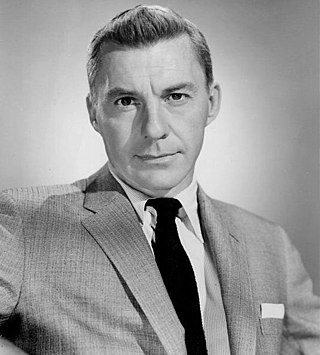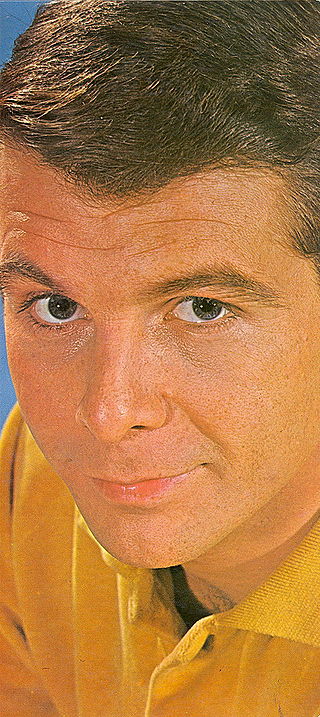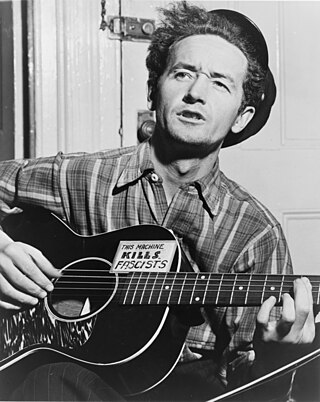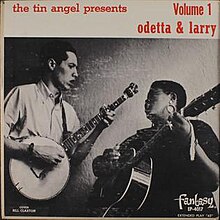
James Henry Miller, better known by his stage name Ewan MacColl, was an English folk singer-songwriter, folk song collector, labour activist and actor. Born in England to Scottish parents, he is known as one of the instigators of the 1960s folk revival as well as for writing such songs as "The First Time Ever I Saw Your Face" and "Dirty Old Town".
Gordon Hill Jenkins was an American arranger, composer, and pianist who was influential in popular music in the 1940s and 1950s. Jenkins worked with The Andrews Sisters, Johnny Cash, The Weavers, Frank Sinatra, Louis Armstrong, Judy Garland, Nat King Cole, Billie Holiday, Harry Nilsson, Peggy Lee and Ella Fitzgerald.

Odetta Holmes, known as Odetta, was an American singer, often referred to as "The Voice of the Civil Rights Movement". Her musical repertoire consisted largely of American folk music, blues, jazz, and spirituals. An important figure in the American folk music revival of the 1950s and 1960s, she influenced many of the key figures of the folk-revival of that time, including Bob Dylan, Joan Baez, Mavis Staples, and Janis Joplin. In 2011 Time magazine included her recording of "Take This Hammer" on its list of the 100 Greatest Popular Songs, stating that "Rosa Parks was her No. 1 fan, and Martin Luther King Jr. called her the queen of American folk music."

David Wayne was an American stage and screen actor with a career spanning over 50 years.

Samuel Robert Gibson was an American folk singer and a key figure in the folk music revival in the late 1950s and early 1960s. His principal instruments were banjo and 12-string guitar.
"Cotton Fields (The Cotton Song)" (also known as In Them Old Cotton Fields Back Home) is a song written by American blues musician Huddie Ledbetter, better known as Lead Belly, who made the first recording of the song in 1940.
James Stevens was an American writer and composer. Born in Albia, Iowa, he lived in Idaho from a young age, and based much of his later novel Big Jim Turner (1948) on his childhood spent in Pacific Northwest logging camps. After fighting in World War I, he came back to work in the woods and sawmills of Oregon.

The Tin Angel is Odetta & Larry's only album, and the first recording by Odetta, originally released in September 1954 on Fantasy Records.

Odetta Sings Ballads and Blues is the debut solo album by American folk singer Odetta. It was released in November 1956 by Tradition Records.

Odetta is a 1963 compilation album by American folk singer Odetta. Odetta is the first official compilation of Odetta songs. It features songs from her two albums on the Tradition label, Odetta Sings Ballads and Blues and At the Gate of Horn and a few tracks from Odetta and Larry LP, The Tin Angle.
"Rock Island Line" is an American folk song. Ostensibly about the Chicago, Rock Island and Pacific Railroad, it appeared as a folk song as early as 1929. The first recorded performance of "Rock Island Line" was by inmates of the Arkansas Cummins State Farm prison in 1934.

"Waterboy" is an American traditional folk song. It is built on the call "Water boy, where are you hidin'?" The call is one of several water boy calls in cotton plantation folk tradition.

The American folk music revival began during the 1940s and peaked in popularity in the mid-1960s. Its roots went earlier, and performers like Josh White, Burl Ives, Woody Guthrie, Lead Belly, Big Bill Broonzy, Richard Dyer-Bennet, Oscar Brand, Jean Ritchie, John Jacob Niles, Susan Reed, Paul Robeson, Bessie Smith, Ma Rainey and Cisco Houston had enjoyed a limited general popularity in the 1930s and 1940s. The revival brought forward styles of American folk music that had in earlier times contributed to the development of country and western, blues, jazz, and rock and roll music.

The KFRC Fantasy Fair and Magic Mountain Music Festival was an event held June 10 and 11, 1967, at the 4,000-seat Sidney B. Cushing Memorial Amphitheatre high on the south face of Mount Tamalpais in Marin County, California. Although 20,000 tickets were reported to have been sold for the event, as many as 40,000 people may have actually attended the two-day concert, which was the first of a series of San Francisco–area cultural events known as the Summer of Love. The Fantasy Fair was influenced by the popular Renaissance Pleasure Faire and became a prototype for large scale multi-act outdoor rock music events now known as rock festivals.
"The Frozen Logger" is an American folk song, written by James Stevens. It is a tall tale song which makes reference to a logger being identifiable by the habit of stirring coffee with his thumb.
Odetta's discography is large and diverse, covering over 50 years and many record labels.

The Tradition Masters is an album by American folk singer Odetta, released in 2002.
Lawrence B. Mohr is an American political scientist and Professor Emeritus of Political Science and Public Policy in the Gerald R. Ford School of Public Policy at the University of Michigan. He served on the University of Michigan's faculty from 1966 until retiring on May 31, 1999. Previously, he was half of the folk/blues musical duo Odetta and Larry, along with Odetta, whom he first met in 1953.
The Tin Angel was a lesbian nightclub, live music venue, and restaurant in operation from 1953 to 1961, on the Embarcadero at 981 Embarcadero in San Francisco, California, U.S. The venue and its founder were credited as "spearheading the 'Jazz on the Waterfront' movement" in the 1950s. In 1958, the club ownership changed and it was renamed On-The-Levee, before its closure in July 1961.











